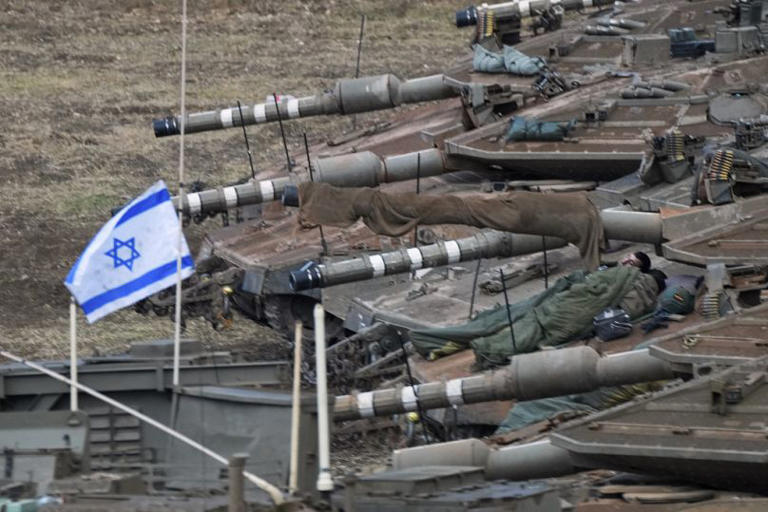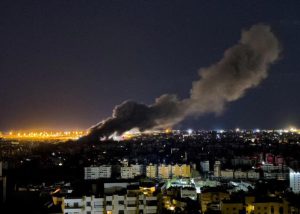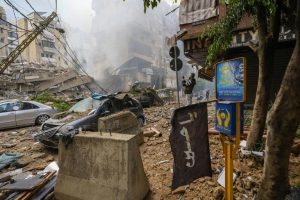By Laila Bassam and Humeyra Pamuk
BEIRUT/WASHINGTON (Reuters) -Israel launched an airstrike on Wednesday on the municipal headquarters in Nabatieh, a major town in south Lebanon, killing the mayor and at least five others.
The attack raised fears that Israel’s expanding air campaign, designed to crush Iran-backed Hezbollah, could increasingly include public officials and buildings, which so far have been spared.

Debris lies at a damaged site in the aftermath of Israeli strikes on Beirut’s southern suburbs, amid the ongoing hostilities between Hezbollah and Israeli forces, Lebanon October 16, 2024. REUTERS/Ahmad Al-Kerdi
© Thomson Reuters
It was the most significant Israeli hit yet on a Lebanese state building since it launched its offensive two weeks ago and came despite U.S. concerns about rising death tolls and fears of all-out war in the region.

Rubble lies at a damaged site in the aftermath of Israeli strikes on Beirut’s southern suburbs, amid the ongoing hostilities between Hezbollah and Israeli forces, Lebanon October 16, 2024. REUTERS/Ahmad Al-Kerdi
© Thomson Reuters
The health ministry said six people had been killed, with the interior minister confirming the death of the mayor.
After Israel first issued an evacuation notice for Nabatieh, a city of tens of thousands of people, on Oct. 3, a Reuters reporter called Mayor Ahmed Kahil to ask if he would leave. He said he would not.
Israel’s military said on Wednesday it struck dozens of Hezbollah targets in the Nabatieh area and dismantled underground infrastructure, while its navy also hit dozens of targets in southern Lebanon, in cooperation with troops on the ground.
Israel is now battling Tehran’s allies Hezbollah in south Lebanon and in the capital Beirut and the Palestinian militants Hamas in Gaza. It is also preparing to retaliate for an Iranian missile attack on Oct. 1, following a similar large-scale operation in April.

Rubble lies at a damaged site in the aftermath of Israeli strikes on Beirut’s southern suburbs, amid the ongoing hostilities between Hezbollah and Israeli forces, Lebanon October 16, 2024. REUTERS/Ahmad Al-Kerdi
© Thomson Reuters
Options include an attack on the Islamic Republic’s oil facilities, a move that would hammer Iran’s economy and raise global oil prices, or its nuclear facilities.

Smoke billows over Beirut’s southern suburbs after an Israeli strike, amid the ongoing hostilities between Hezbollah and Israeli forces, as seen from Hadath, Lebanon October 16, 2024. REUTERS/Mohamed Azakir
© Thomson Reuters
LOW PROBABILITY OF ATTACK ON NUCLEAR SITES
The probability of an attack on Iran’s nuclear sites remains low but any potential damage would be “quickly compensated,” state atomic energy agency spokesperson Behrouz Kamalvandi said on Wednesday, according to semi-official Nournews.
“We have always taken these threats seriously. We have planned in a way that if they commit any stupidity, the damages would be minimal,” Kamalvandi said.
Earlier on Wednesday, at least one Israeli airstrike hit Beirut’s southern suburbs, Reuters witnesses said.
Reuters witnesses heard two blasts and saw plumes of smoke emerging from two separate neighbourhoods. It came after Israel issued an evacuation order early on Wednesday, which mentioned only one building.
On Tuesday, State Department spokesperson Matthew Miller said the U.S. had expressed its concerns to Prime Minister Benjamin Netanyahu’s administration on the recent attacks on Beirut.
The last time Beirut was hit was on Oct. 10, when two strikes near the city centre killed 22 people and brought down entire buildings in a densely populated neighbourhood.
The Israeli military has in recent weeks carried out strikes on Beirut’s southern suburbs, the stronghold of Hezbollah, without advance warnings, or with a warning for one area while striking more broadly.
The Israeli military said on Wednesday it had targeted an underground Hezbollah weapons stockpile in the southern Beirut suburb of Dahiyeh.
“Prior to the strike, numerous steps were taken to mitigate the risk of harming civilians, including advancing warnings to the population in the area,” the Israeli military said.
Hezbollah has not yet commented.
NO SIGNS OF CEASEFIRE
Some Western countries have been pushing for a ceasefire between the two neighbours, as well as in Gaza, though the United States says it continues to support Israel and was sending an anti-missile system and troops.
Natanyahu and his far-right government has rejected ceasefire calls and has vowed to crush Hamas and Hezbollah.
Lebanon’s Mikati on Wednesday also appeared to cast doubt on diplomatic efforts to reach a ceasefire.
“What can deter the enemy (Israel) from its crimes, which have reached the point of targeting peacekeeping forces in the south? And what solution is hoped for in light of this reality?,” he said in a written statement.
Since Israel began its ground incursion, UNIFIL positions have come under fire and two Israeli tanks burst through the gates of one of its bases, the U.N. says. Five peacekeepers have been injured.
European Union countries that contribute have no intention of pulling back despite Israeli calls to do so, Austrian Foreign Minister Alexander Schallenberg said.
Sixteen EU countries, including Austria, contribute to UNIFIL and the recent incidents have sparked widespread alarm among European governments.
Israel says it intends to push back Hezbollah and allow the safe return of tens of thousands of Israelis to their homes in northern Israel.
Israeli operations in Lebanon have killed at least 2,350 people over the last year and left nearly 11,000 wounded, according to the health ministry, and more than 1.2 million people have been displaced. The U.N. says a quarter of the country is under evacuation orders.
The toll does not distinguish between civilians and combatants but includes hundreds of women and children.
Around 50 Israelis, both soldiers and civilians, have been killed in the same period, according to Israel.
(Reporting by Laila Bassam and Timour Azhar in Beirut, Humeyra Pamuk in Washington and Andrew Gray in Brussels; Writing by Lincoln Feast and Michael Georgy; Editing by Stephen Coates, Raju Gopalakrishnan and Sharon Singleton)




 Politics8 months ago
Politics8 months ago
 Business8 months ago
Business8 months ago
 Politics4 months ago
Politics4 months ago
 SportsNews7 months ago
SportsNews7 months ago
 Politics7 months ago
Politics7 months ago
 Entertainment8 months ago
Entertainment8 months ago
 Politics4 months ago
Politics4 months ago
 Business8 months ago
Business8 months ago










